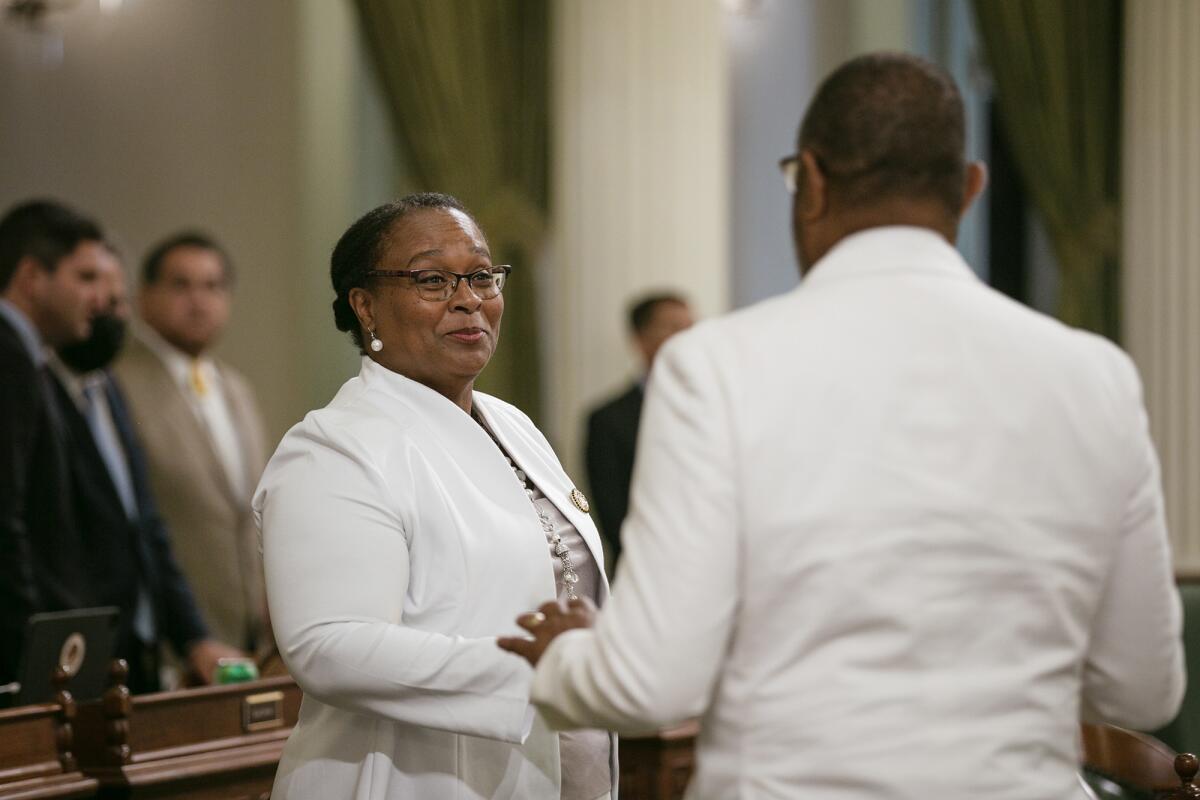California could end forced prison labor. Will lawmakers send this measure to the ballot?

- Share via
SACRAMENTO — California lawmakers have revived a proposal that could ask voters to ban involuntary servitude in the state Constitution, a measure they rejected two years ago amid concerns over the cost of paying prisoners higher wages for the work they do behind bars.
The new version of the proposal would make prison work optional and says the state would not have to pay prisoners minimum wage — but it would not strike language in the Constitution that says “involuntary servitude is prohibited except to punish crime.”
Final details are still being negotiated, and advocates hope they can persuade lawmakers to craft a measure that would remove that phrase from the Constitution. But the clock is ticking — lawmakers face a June 27 deadline to pass measures that will go on the November ballot.
The debate has some people concerned that California could wind up embracing a measure that has more symbolic power than real-world impact.
“We don’t believe in doing anything symbolic. We don’t want to just change the wording and have the practice still exist,” said Lawrence Cox, who was incarcerated for 17 years and now works as an advocacy coordinator at All of Us or None, a group that advocates for prisoners and their families.
California lawmakers could let voters decide whether to ‘prohibit slavery in any form,’ which could change work requirements in prisons.
California is one of 16 states whose constitutions allow forced labor in prisons. Some prison workers make as little as 8 cents an hour.
After lawmakers rejected a proposed constitutional change in 2022, Assemblymember Lori D. Wilson (D-Suisun City), chair of the Legislative Black Caucus, brought back the measure last year as one of 14 bills to advance reparations for the descendants of enslaved Americans.
The measure would “prohibit slavery in any form” and states that a prison or jail “shall not punish” an incarcerated person for refusing a work assignment. The measure also clarifies that prisons and jails cannot be prohibited from awarding an incarcerated person credit toward their sentence for voluntarily accepting a work assignment.
If passed by two-thirds of the Senate, Assembly Constitutional Amendment 8 will be placed on the November 2024 ballot for California voters to decide.
Sen. Steven Bradford (D-Gardena), a member of the Reparations Task Force, said lawmakers must make further changes to the proposal to define “work.” Otherwise he fears that inmates who are assigned certain communal jobs, such as kitchen or laundry duty, might not be protected by this constitutional change.
Wilson promised those definitions would be hashed out.
“You have my commitment,” Wilson told members of the Senate Elections and Constitutional Amendments Committee, which unanimously passed the measure Tuesday.
Sen. Tom Umberg (D-Orange) asked for those definitions to be made clear before the measure heads to a floor vote next week.
Proponents call this the “ground zero” of reparations work and the first step to addressing other inequities in the prison system.
The California Legislative Black Caucus released a list of 14 bills as a first set of reparations for the descendants of African Americans who were enslaved.
Democratic lawmakers faced a major setback two years ago when the Department of Finance pinned a hefty cost to the bill and suggested that the Department of Corrections and Rehabilitation would have to begin paying its 65,000 working prisoners minimum wage. The failure to pass the constitutional amendment reverberated throughout the Legislature and pitted Democrats against one another.
“This is not something you want to mess up,” Wilson told The Times about introducing the measure a second time around.
The corrections and rehabilitation department doubled wages for inmates last year — with many workers still earning less than $1 an hour — while simultaneously cutting work hours by half. Criminal justice advocates argued that that policy change was deceptive because inmates would still earn the same pay.
Right now, about 40% of the 93,000 inmates in California’s prisons have jobs, including janitorial work, kitchen duty, clerking and fighting fires in the wilderness, one of the most physically intensive and highest-paid positions.
Criminal justice advocates say it’s a myth that inmates don’t want to work. Proponents of the constitutional change believe that “forced labor is not rehabilitative” and that forced work takes away from productive rehabilitation services. Advocates also say that the change will “improve worker productivity” because it will allow inmates to choose jobs they want to do.
More to Read
Sign up for Essential California
The most important California stories and recommendations in your inbox every morning.
You may occasionally receive promotional content from the Los Angeles Times.













